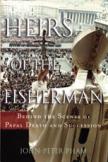Closing in on the Short List
A dark joke about prognostication concerning the successor to Pope John Paul II is that he outlived many of those once considered most likely to succeed.
A new book on papal succession, Heirs of the Fisherman, was published not long before the pope took his precipitous turn for the worse. While John-Peter Pham takes his shot at a short list, the bulk of the book is resource material whose usefulness has not died with John Paul or the current papabile.
While it looks to the future, Heirs of the Fisherman offers a grand historical sweep of significant elections past. Pham explains how conclaves developed and the forces that shaped their present, and still evolving, form. He writes with clarity and verve, even on topics as convoluted as the Great Western Schism. He does not just give dates and names, but makes history come alive in a way that illumines the present.
Here he summarizes the result of the 27-month conclave of 1291-94, at which desperate cardinals finally elected the miracle-working hermit Pietro del Morrone as Pope Celestine V, best known for his resignation from the papacy. Pham writes:
To characterize the choice as eccentric is probably an understatement. While electing the reluctant Celestine V seemed a charismatic bold stroke, the fact was that, for all his piety and reputation for holiness, the new pope was hopelessly naïve, almost ridiculously incompetent, and rather ill educateda dangerous combination in those troubled times.
It quickly became evident that when Pope Celestine was not a puppet manipulated by the French King Charles - French nominees of the king accounted for seven of the twelve cardinals created by Celestine - he fell into confusion, assigning, for example, the same benefice to more than one applicant.
The book is arranged topically. The first chapter reviews varied circumstances under which popes have died, from old age to assassination. Others examine how popes were chosen in the millennium before conclaves came into being, how and why conclaves achieved their present form, conclaves of the 20th century and papal coronations and installations. The final chapter is Pham’s analysis of who and what will shape the next conclave.
A former priest of the Diocese of Peoria and a former papal diplomat, Pham has theologically conservative credentials, but they rarely come to the fore in this writing. Whether his views have moderated or because he now addresses a largely secular audience in his teaching post at James Madison University - or both - Pham is generally centrist in tone. His high regard for the papacy is discernible, especially in his opening assessment of John Paul. But he writes dispassionately about the worst papal scandals, and tries to give the concerns of both right and left their due.
Unlike John Allen in Conclave, Pham does not attempt to identify factions among the electors; and serious students of the conclave would do well to own both books. Pham first offers a list of unelectable cardinals who he believes will influence the outcome. He outlines qualifications that he believes the cardinals will consider necessary. Pham is perhaps too confident that the cardinals will seek another charismatic figure with media presence, and too pessimistic that the loss of Latin as a common tongue will result in poor communication among the electors. Time will tell.
His short list of five papabile overlaps with Allen’sthe exception being Pham’s inclusion of Cardinal Severino Poletto of Turin. His list is strikingly devoid of a Latin American and includes three Italians. Pham considers Christoph Schönborn of Vienna the most qualified, but laments that he is too young to follow a long-reigning pope. The issues he believes electors will take into account include collegialityhe calls it hierarchical communionvocations, clergy scandals, the role of the laity, contraception, women in the church, divorce and remarriage, ecumenism, relations with Islam, church-state issues, theological pluralism and the global southward shift of Catholicism.
The historical background clarifies his analysis, as when Pham considers how the electors may balance their desire for a pope with archdiocesan pastoral experience against the desire for someone to keep the Curia in line. He thinks they will opt for someone with Roman experience:
[T]hey will be aware that a novice cannot be enthroned in the Apostolic Palace without the central administration of the Church grinding into gridlock as the various curial factions and ambitious Roman prelates run circles around the newcomer. Memories are long on Vatican Hill, and many will recall that the last total outsider elected to the papacy - John Paul I’s thirty-three day reign being too short to evaluate - was Pius X, and remember the results of that pontificate in crises like the witch hunts for modernism and the rupture with France.
Of the book’s 368 pages, 144 are very useful appendices. They include the full text of John Paul’s instructions for the next conclave, biographical sketches of key figures past and present, a glossary of ecclesiastical terms from ad limina to zucchetto and the last wills and testaments of Popes John XXIII and Paul VI. For those interested in understanding the conclave, Pham’s book will be invaluable.
This article also appeared in print, under the headline “Closing in on the Short List,” in the April 18, 2005, issue.








